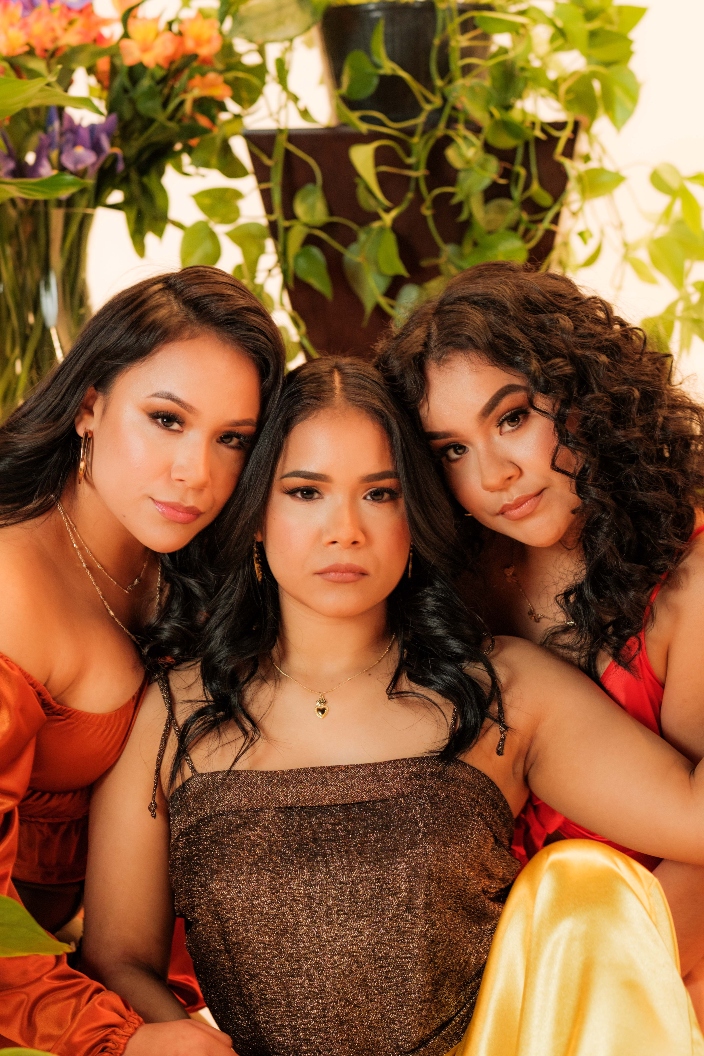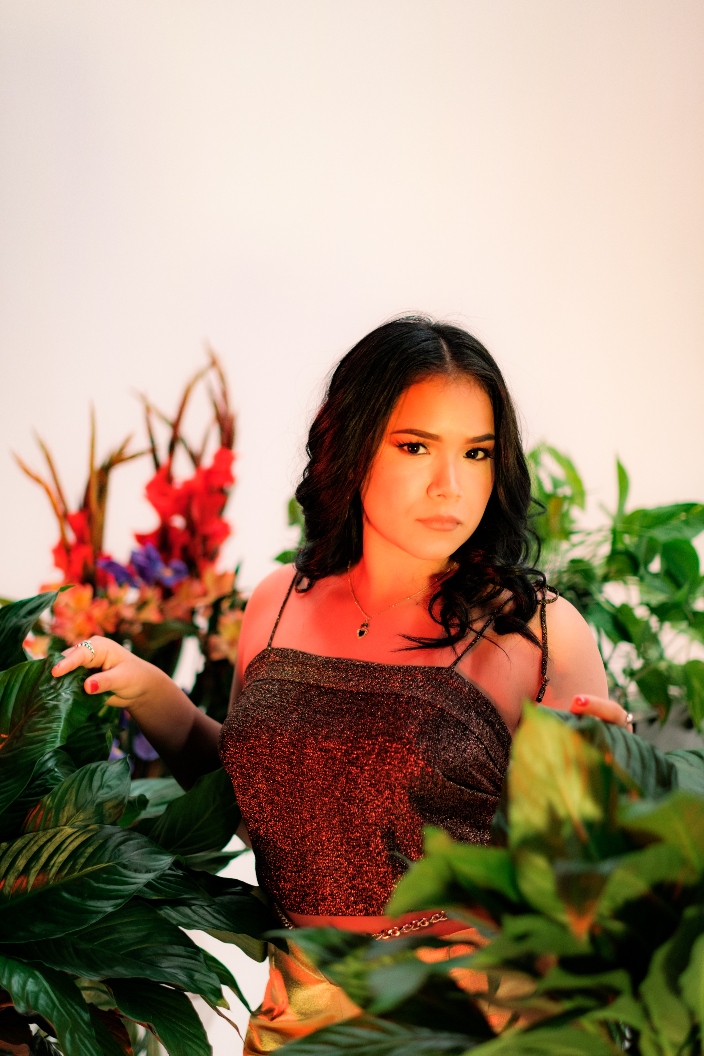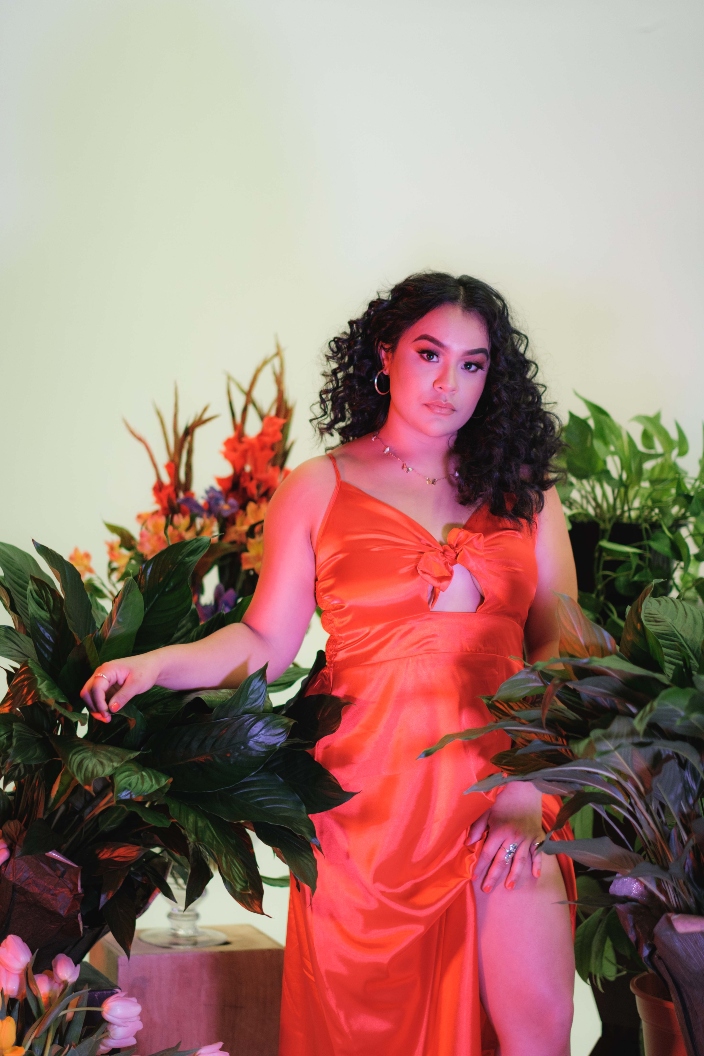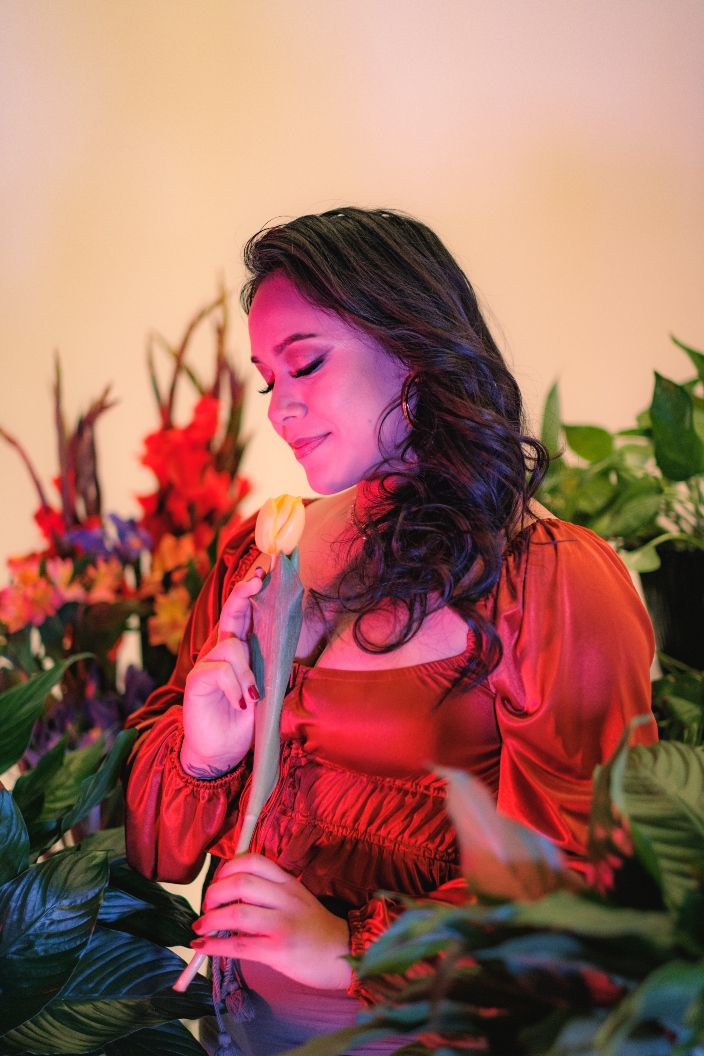They are The Tiarras. This band of sisters can change their name, but not their roots.

By Brianna Caleri, Photos by Jay Ybarra
No matter how much or how little people expect from them, girl groups are powerful. One band can float between genres, fusing cumbia, reggae, ska and more; perform at political rallies, demonstrations and celebrations; help register new voters; interview queer role models. The Tiarras, a band of sisters, do all this and more. Winning three Austin Music Awards and being featured as an Artist of the Month by Austin360 along the way.
Making trouble comes with the territory, but it’s not what it’s about. Despite feeling called to represent Latinas through confident rock shows and defiant music videos, the group’s priorities are chiefly to make people dance and connect with their culture.
For The Tiarras, it stays in the family. Hector Baltierra was a DJ with a supportive wife, Debbie. She booked Hector’s gigs for him, and they went as a unit. The pair brought their three daughters—each born two years from the other—to weddings and dance parties, endless personal events where memories were made and celebrated to a soundtrack curated specifically for each one.
Each of the sisters independently mention their dad without prompting; he is their origin story. They unfold, in loving detail, the way he molded the atmosphere through sound.
“I vividly remember sitting next to the speakers and introducing my body and my mind to the other frequencies that could fill up the room…that my dad could control,” says Tiarras guitarist, vocalist and youngest sister Tori Baltierra.
Sophia Baltierra, the middle sister and drummer of The Tiarras, references her dad’s cumbia beats (an Afro-Latino two-step), crediting them for instilling in her a sense of rhythm. Like Tori, Sophie talks about controlling a room, this time in interrogating The Tiarras’ sense of purpose as a band. “Why do we make these songs?” she asks. The answer: to get people dancing, to get them involved in their culture.
Eldest sister and bassist Tiffany Baltierra changes the subject from her dad’s musical ability to his research chops; he found her the perfect starting gear and discovered paths for her to take with it. “He’s immersed himself in our world,” she says, perhaps without realizing the irony of closing that loop: bringing his kids into his world and readapting to fit their own niche within it.
The Tiarras are standing on a precipice of identity as a band. Their name change reflects the reality that, believe it or not, family bands do have to grow up. The Tiarra Girls were as advertised for their first decade or so together. Now the audience sees three women step onstage.
Aside from offering a more grown-up identity, the rebranding broadens the scope of who a Tiarra is, anyway. The band is no longer a generational fragment of a family; now it represents an entire lineage. It’s not the Tiarra Girls, the way you would say, “The Baltierra girls down the street really picked up their parents’ talent.” It’s The Tiarras, as in, “The Baltierras have been in the music business for generations. It’s in their blood.”
TORI: The Ideas Girl

Tori Baltierra grew up around music, like all the Tiarras, but it really hit her in school. (“She’ll probably bring up the Beatles song that she learned,” says Sophia, in one of several moments in which the separated Tiarras performed either the clairvoyant or intensively practiced feat of saying the exact same thing.) A teacher played the surprisingly deep cut “Ob-La-Di, Ob-La-Da’’ on the guitar for his elementary school students, and Tori felt a shift in the room.
“I was always very shy growing up,” Tori reveals. “Never wanted to talk. I wouldn’t sing, which is really funny [because]I’m a singer now. It made me not want to be shy anymore.”
It is surprising to hear that Tori, the literal and figurative voice of The Tiarras, was ever shy. Now she speaks fluidly and poetically about being the old soul of the family, despite being the youngest sister. She is clearly the ideas person, concise in describing her artistry but seemingly never out of things to say. As the youngest often does, she tends to call the shots.
“I’m glue in between the cracks of the band and the powerhouse” Tori says. “It’s really nice in that kind of setting; when we’re doing band stuff I’m kind of like the older sister, but then outside of it I’m the baby. It’s really fun to tap into both worlds.”
She certainly is forceful, with a deep but nearly nasal singing voice much like Gwen Stefani’s (a comparison she hears often and happily accepts). Most Tiarras songs start with an idea from Tori, and she writes all the lyrics, anchoring the music to her personal experience in a much more tangible way than the instrumentalists are afforded.
In her coming out song “Let Love Free,” the singer takes a central narrative role and renounces any intention of hiding her lesbian identity any longer. One scene in the music video includes a loving hug from her real-life father that sent other dads to her direct messages in appreciation. Some of them talked about the song with their own daughters who had just come out.
“We portrayed a Mexican-American family that was open about talking about queer relationships and identity,” says Tori. “I think it just got a spark going in people’s minds and inspired them to take that next step.”
SOPHIA: The Weightlifter

Sophia Baltierra speaks with a pleasant, nearly imperceptible impatience. Her voice carries a sense of drive befitting a drummer. Even more than the others, she talks about being attuned to her sisters and knows they’ve disagreed on some things, but struggles to come up with an example. While Tori comes to writing sessions with the base ideas, Sophia helps take the next step.
“I usually start to feel something in my body,” says Sophia. “I start tapping on the table to show Tiffany and Tori what I’m already thinking right then and there, and if I see them groove with me I know that that’s the beat we’re probably going to start working off of.”
She watches their faces and says the results aren’t particularly hard to see. Of course, they’re comfortable enough working together that they’re not holding any of their feelings back. They tend to agree musically—one of the perks of sharing formative moments in their childhood music tastes.
“Leave It to the People” contains Sophia’s favorite writing contributions, marking the moment their sound started to reflect who The Tiarras really are. Compared to the Tiarra Girls EP, which is a light and fluffy collection of beach rock and R&B, “Leave It to the People” is dark, moody and full-bodied.
The verses in English detail cultural changes in motion, and the chorus in Spanish—“no lo apoyaremos”—is politically defiant, perhaps surprising to some listeners with preconceived ideas of what a family band of young women sing about. This effort was more about embracing cultural roots and included a shift to more cumbia-based rhythmic structures. Since The Tiarras made that shift in 2018, Sophia predicts the only thing that will change for now is their name.
This drummer, a recreational weightlifter who the band sometimes cheers on via social media, is an almost-too-convenient symbol of power in women. Fittingly, she’s also the one who speaks the most ambitiously about the rebrand.
“We’re grown women now,” she says. “I want to continue to make the music that we are [making]. I just want people to still continue to…feel something with our music. A lot of our audience is the same age as us, maybe older. So I still want them to be able to connect with us.”
TIFFANY: The Editor

It’s another sibling cliche: the eldest makes the sacrifices. In the early history of The Tiarras, Tori started playing the guitar, and Sophia picked up the drums. Tiffany was learning the piano, and the three would come together at home to practice. The problem was there wasn’t enough bass. Tiffany was already playing those parts with her left hand, so the 13-year-old did what many bassists do: abandoned her initial instrument for the good of the group.
“I went to the bass for a little bit and got upset about how thick the strings were, so then I jumped back to the keyboard,” Tiffany recounts. But she missed the feeling of locking into the rhythm section. “I felt more power and a little bit more of the beat. So I was like, ‘I’m just going to keep practicing and get over this. [My fingers] are not gonna be the same size the rest of my life.’”
It’s a similar journey to one of Austin’s most influential instrumentalists, bassist Kathy Valentine of the early-punk girl group The Go-Go’s (who The Tiarra’s have covered, with “Can’t Stop the World”). Tiffany reached out to Valentine one day, looking for advice after being told one too many times that the Tiarra Girls should smile more while onstage. The established rocker encouraged her to shake off those outside opinions, to embody what the music meant to her instead.
In the music video for “Soy Chingona,” a rallying cry for combative women with good reason to be, The Tiarras play women with traditionally masculine jobs. Of course, Tori was a musician. Sophia, naturally, was an athlete (although boxing was new for the weightlifter). Tiffany, a graduate nurse, played something completely out of her wheelhouse again: a mechanic working on classic cars in their uncle’s garage in Austin.
The shapeshifting sister is ready to adapt thanks to a natural inclination toward structure, which often helps in songwriting when it’s time to edit songs down from long jams. She likes having the opportunity to “model” that structure to her siblings. But those days are almost over.
“I still see Tori as 12 years old, even though she’s 21. I’ve had more conversations recently about feeling like I have to set the example, [but]we’re not teenagers anymore,” Tiffany says. “We can all set an example for each other, and it’s not just me.”


